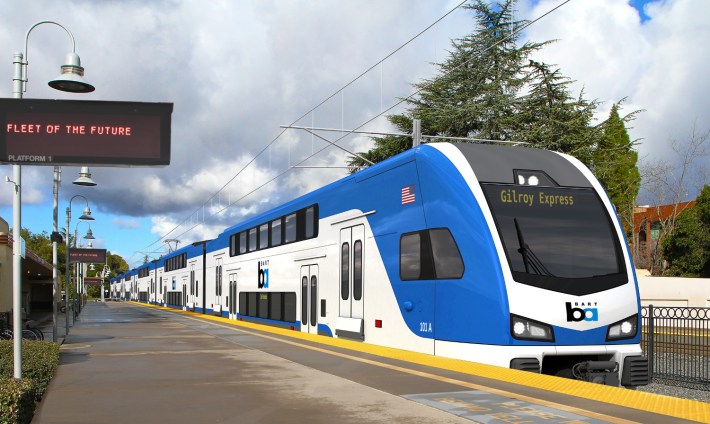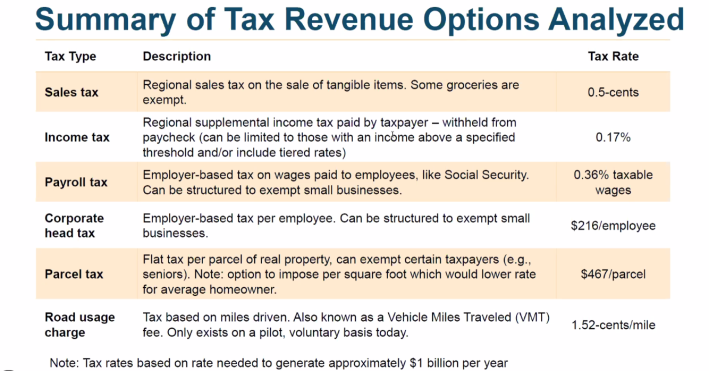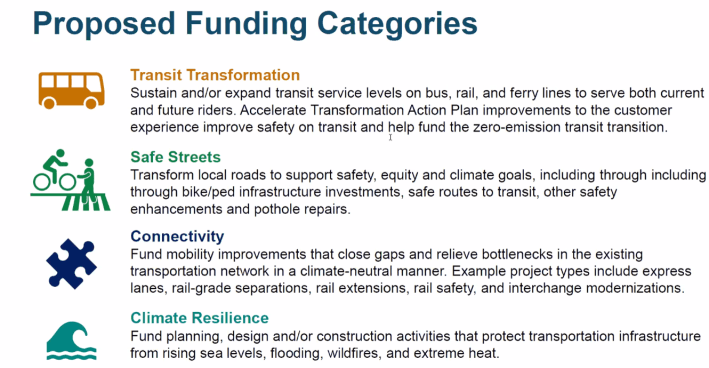The Metropolitan Transportation Commission (MTC) got a look at what a $1 billion regional transit measure might entail during its regular meeting Wednesday morning. "73 percent [of those polled] thought seamless fares and schedules were important," said Rebecca Long, MTC's legislative analyst, during a presentation to the commission directors.
Long was citing polling data that's part of her report on the proposed measure. People want “service, fares, schedules and customer information and transit identity coordinated and consistent across transit systems,” she added. In fact, finding ways to make the system more seamless for users, across the Bay Area's 27 transit operators, was a central theme and apparently a requirement of the new funding measure.

The idea is for any funding measure to bake in requirements to make sure operators start cooperating with one another and putting the customer first if they want a share of the funds. "Everything is on the table to really improve the transit system, and that includes strengthening the role of the network management," said Andrew Fremier, MTC's Director.
Everything, except perhaps merging BART and Caltrain, which is also under study for the funding measure. "Not to be parochial," said MTC commissioner and former Mayor of Mountain View, Margaret Abe-Koga, "but I don’t know why we continue to discuss this, we’re just fueling the fire for opposition." Abe-Koga was backed up by other commissioners, and letters from Peninsula groups, in opposing a merger of BART and Caltrain.
It's unclear exactly why there is opposition to even discussing a BART-Caltrain merger as part of the measure, except for claims that it would be a "distraction." Other commissioners pushed back, asking why they shouldn't explore efficiencies that might be gained. "It’s very short-sighted if we just take things off the table," said Commissioner James Spering, who represents Solano County. "Maybe the word is not consolidate, maybe it’s coordinate, but we have a responsibility to do this and I think we need to be very specific about what we want."
Meanwhile, MTC staff is still trying to figure out what form the tax measure will take. Sales taxes and various income taxes were discussed. Long also said the measure might be broken into several different taxes over time.
Whatever form it ultimately takes, San Francisco Senator Scott Wiener has already signaled his willingness to sponsor the enabling legislation, needed to get the measure on the ballot. From a letter from his office to the MTC:
I support a regional transportation measure that provides that revenue for transit operations, prevents our agencies from falling off the fiscal cliff, expands transit, and transforms the system for the rider. Additional revenues should be accompanied by improvements to safety, cleanliness, and reliability, as well as a seamless system that provides an integrated experience for the rider. We cannot go back to the status quo. We need to develop consensus on a transformative vision for public transportation that helps achieve these goals. A regional transportation network manager is an effective example of this vision.
Regardless of the structure or merits of the legislation, staff warned that it's going to be difficult to get voter approval.

Additionally, several commissioners and speakers from the public opined that $1 billion may not be enough to make substantial improvements to the region's transit system, given the financial problems operators are already facing. "We need a $2 billion scale with an emphasis on operational funding to provide the service levels we need," said Bob Allen of Urban Habitat, who addressed the meeting during public comment. "We should not overreact to polls - the measure isn't going to the ballot right now and we will need leadership to build the needed political and voter support."

Others on the commission stressed that transit agencies need to work hard on improving service now so voters see firsthand that things can improve. "I was recently on BART," said Sue Noack, the commissioner who represents Contra Costa. "The train was clean, we were met by a friendly ambassador, and two BART police came through. It was a good experience. A lot more people need to see those things now in order to get a measure passed."
A revised measure will come back to the commission on January 24. From there it would head to Sacramento. The legislature’s bill introduction deadline is February 16, 2024 for a measure that, if authorized, would go before voters two years after that.






